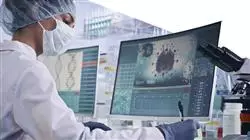University certificate
The world's largest faculty of engineering”
Introduction to the Program
A program that will qualify you in the field of biomedical image analysis and the control of socio-health data, in order to optimize medical care"

Far from applying mechanical and sanitary care, data analysis and biomedical imaging make it possible to improve the diagnosis for each individual case. The extensive collection of data available to healthcare centers can be managed quickly and easily thanks to Big Data, but, above all, it allows heterogeneous information from different centers to be contrasted.
Given the need, public health requires professionals who know how to respond to problems and can implement the latest tools. TECH has detected the demand for professionals by companies and, therefore, offers thisPostgraduate diploma inBiomedical Image Analysis and Big Data in E-Health to graduates in Engineering who wish to update their knowledge in this field. Students who receive the program will have a Relearning methodology that will avoid long hours of study and will enable them to assimilate the concepts in a simple and progressive way.
In addition, TECH is supported by a team of professionals who work in this field and who even have their own research in telemedicine. Thanks to their experience and the exhaustive and personalized tutoring they offer, students will be able to resolve their doubts at any time and place. Likewise, they will have downloadable content in different formats that will provide them with all the necessary information to guarantee their education.
Thanks to TECH, you will learn about the applications of Big Data in public health, such as risk predictions or personalized medicine through biomarkers"
This Postgraduate diploma in Biomedical Image Analysis and Big Data in E-Health contains the most complete and up-to-date educational program on the market. Its most notable features are:
- The development of practical cases presented by experts in biomedical imaging and databases
- The graphic, schematic, and practical contents with which they are created, provide practical information on the disciplines that are essential for professional practice
- Practical exercises where self-assessment can be used to improve learning
- Its special emphasis on innovative methodologies
- Theoretical lessons, questions to the expert, debate forums on controversial topics, and individual reflection assignments
- Content that is accessible from any fixed or portable device with an Internet connection
Inquire into the direct relationship between surgical interventions and imaging techniques, delving into their usefulness for recognizing medical patterns"
The program’s teaching staff includes professionals from the sector who contribute their work experience to this educational program, as well as renowned specialists from leading societies and prestigious universities.
Its multimedia content, developed with the latest educational technology, will allow the professional a situated and contextual learning; that is, a simulated environment that will provide an immersive education programmed to learn in real situations.
This program is designed around Problem-Based Learning, whereby the professional must try to solve the different professional practice situations that arise during the course. For this purpose, the student will be assisted by an innovative interactive video system created by renowned and experienced experts.
Learn about the benefits of IoT in patient monitoring and care and understand its contribution to the rehabilitation of those affected"

Thanks to the knowledge that TECH will transmit to you, you will learn about the multiple advantages that IoT brings by communicating devices with each other"
Why study at TECH?
TECH is the world’s largest online university. With an impressive catalog of more than 14,000 university programs available in 11 languages, it is positioned as a leader in employability, with a 99% job placement rate. In addition, it relies on an enormous faculty of more than 6,000 professors of the highest international renown.

Study at the world's largest online university and guarantee your professional success. The future starts at TECH”
The world’s best online university according to FORBES
The prestigious Forbes magazine, specialized in business and finance, has highlighted TECH as “the world's best online university” This is what they have recently stated in an article in their digital edition in which they echo the success story of this institution, “thanks to the academic offer it provides, the selection of its teaching staff, and an innovative learning method aimed at educating the professionals of the future”
A revolutionary study method, a cutting-edge faculty and a practical focus: the key to TECH's success.
The most complete study plans on the university scene
TECH offers the most complete study plans on the university scene, with syllabuses that cover fundamental concepts and, at the same time, the main scientific advances in their specific scientific areas. In addition, these programs are continuously being updated to guarantee students the academic vanguard and the most in-demand professional skills. In this way, the university's qualifications provide its graduates with a significant advantage to propel their careers to success.
TECH offers the most comprehensive and intensive study plans on the current university scene.
A world-class teaching staff
TECH's teaching staff is made up of more than 6,000 professors with the highest international recognition. Professors, researchers and top executives of multinational companies, including Isaiah Covington, performance coach of the Boston Celtics; Magda Romanska, principal investigator at Harvard MetaLAB; Ignacio Wistumba, chairman of the department of translational molecular pathology at MD Anderson Cancer Center; and D.W. Pine, creative director of TIME magazine, among others.
Internationally renowned experts, specialized in different branches of Health, Technology, Communication and Business, form part of the TECH faculty.
A unique learning method
TECH is the first university to use Relearning in all its programs. It is the best online learning methodology, accredited with international teaching quality certifications, provided by prestigious educational agencies. In addition, this disruptive educational model is complemented with the “Case Method”, thereby setting up a unique online teaching strategy. Innovative teaching resources are also implemented, including detailed videos, infographics and interactive summaries.
TECH combines Relearning and the Case Method in all its university programs to guarantee excellent theoretical and practical learning, studying whenever and wherever you want.
The world's largest online university
TECH is the world’s largest online university. We are the largest educational institution, with the best and widest online educational catalog, one hundred percent online and covering the vast majority of areas of knowledge. We offer a large selection of our own degrees and accredited online undergraduate and postgraduate degrees. In total, more than 14,000 university degrees, in eleven different languages, make us the largest educational largest in the world.
TECH has the world's most extensive catalog of academic and official programs, available in more than 11 languages.
Google Premier Partner
The American technology giant has awarded TECH the Google Google Premier Partner badge. This award, which is only available to 3% of the world's companies, highlights the efficient, flexible and tailored experience that this university provides to students. The recognition as a Google Premier Partner not only accredits the maximum rigor, performance and investment in TECH's digital infrastructures, but also places this university as one of the world's leading technology companies.
Google has positioned TECH in the top 3% of the world's most important technology companies by awarding it its Google Premier Partner badge.
The official online university of the NBA
TECH is the official online university of the NBA. Thanks to our agreement with the biggest league in basketball, we offer our students exclusive university programs, as well as a wide variety of educational resources focused on the business of the league and other areas of the sports industry. Each program is made up of a uniquely designed syllabus and features exceptional guest hosts: professionals with a distinguished sports background who will offer their expertise on the most relevant topics.
TECH has been selected by the NBA, the world's top basketball league, as its official online university.
The top-rated university by its students
Students have positioned TECH as the world's top-rated university on the main review websites, with a highest rating of 4.9 out of 5, obtained from more than 1,000 reviews. These results consolidate TECH as the benchmark university institution at an international level, reflecting the excellence and positive impact of its educational model.” reflecting the excellence and positive impact of its educational model.”
TECH is the world’s top-rated university by its students.
Leaders in employability
TECH has managed to become the leading university in employability. 99% of its students obtain jobs in the academic field they have studied, within one year of completing any of the university's programs. A similar number achieve immediate career enhancement. All this thanks to a study methodology that bases its effectiveness on the acquisition of practical skills, which are absolutely necessary for professional development.
99% of TECH graduates find a job within a year of completing their studies.
Postgraduate Diploma in Biomedical Image Analysis and Big Data in E-Health
The digital transformation in the field of health is constantly evolving, and with it comes the need to update the knowledge and skills of professionals in the sector. For this reason, at TECH Global University we have developed the Postgraduate Diploma in Biomedical Image Analysis and Big Data in E-Health, in order to train the specialists of the future in the latest technological trends applied to health. Supported in a completely online environment with the latest advances in educational technology, we provide you with a series of highly competitive skills in the labor sector, making your profile stand out and transferring market trends to an area that you can master. By instructing you with this program, you will have the opportunity to acquire skills in biomedical image analysis and processing, allowing you to diagnose and treat diseases more effectively.
Be an expert in biomedical image analysis and Big Data in health
.
At TECH Global University we are committed to instructing professionals who meet the demands of the modern labor market. For this reason, we created this complete Postgraduate Diploma, through which you will obtain the key tools that will turn you into a specialist. Here, you will have the support of a team of highly qualified professionals in the area of health and technology, who will guide you through the learning process and offer you the best education to face the challenges of the sector. As you progress through the program, you will be qualified in Big Data applied to healthcare, which will allow you to manage and analyze large amounts of information to improve healthcare systems. Thanks to this, you will have the opportunity to develop a successful career in the digital health industry, taking advantage of the opportunities offered by technology to improve people's lives.







